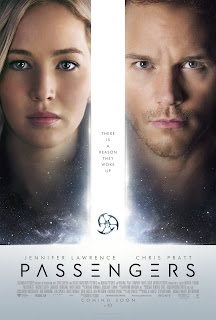Having fallen in love with the Century Mountain View’s reclining cushy seats and large screens after seeing Rogue One there (the theater is a left-over from the domed auditorium days, refitted for pampered Silicon Valley kids) I decided to forgo useful endeavors and see Passengers in 3D.
The first impression is it is a very handsome film, as clean and smooth as a corporate vision of the future... Which this is. The film is set on the Avalon, a colonization ship making a 120-year interstellar voyage the scientifically factual way, without the assist of faster-than-light wishful thinking technology.
The Avalon is a wonder to behold, as interesting to comprehend as the handsome actors who clatter around in it. From the outside it resembles an immense Hobart industrial mixer blade. Inside, it is pure high-end hotel-resort: lovely cabins, swanky restaurants, all the amenities. The sheer amount of open-air space available detracts from the reality of the ship: If the Avalon is on a mission to create profit for it’s owners, they are wasting megatons of energy flying crystal chandeliers and huge swimming pools between stars. Sorry, it’s just a pure Sci-Fi quibble.
 |
| The Avalon, in all it's mixer-blade glory. You can see the massive engine burning fuel from tanks that do not seem to exist. Sorry, another pure Sci-Fi quibble. |
To proceed with this review , I have to write about a •••spoiler•••. But it’s not really a “spoiler,” for two reasons: 1. It occurs at the end of Act I and propels the main narrative in Act II, and 2. many, many other reviewers have also revealed it. Hell, the trailers have revealed it. But it’s important to talk about this because it’s the moral dilemma at the center of both the narrative and the critical framework in which Passengers resides.
 |
| In space, no one can hear you flirt. (I wish I had thought of that line, but it was some other reviewer.) |
Nonetheless, the huge tension in Act II is waiting to see how she is going to find out— and how unbelievably pissed off she is going to be when she does. As audience to this act of kidnapping and deception, for most of Act II I was pissed off for her. What he did is the ultimate violation, a slow murder. Aurora had plans and dreams and places to be: Jim selfishly destroys her entire life because he does not want to be alone. The fact that Jim does this awful thing to a woman makes it worse— and, in fact, it highlights how deeply sexist it is. Imagine if the genders were reversed and Aurora woke up Jim ninety years early and lied about it. The aftermath of the revelation would be short and violent. (This premise pissed off the editors of women-centric website Jezebel so much they spoiled the entire movie, end to end, so nobody has to pay to see it.)
 |
| Pissed. |
The astonishingly immoral center of the narrative takes what looks like a rousing sci-fi movie to disturbing new dimensions. And, strange as it may seem, it makes Passengers a great date film: the discussions after the film is over should really add a lot of new definitions to what a fair relationship is— and how far it can go.
Anyway, on to the movie. That asteroid-caused thing that broke Jim’s hibernation pod is still there and threatens to take down the Avalon, sink it like the Titanic. And this immorally created couple must do what is needed to make that big, utterly predictable Act III conclusion happen.
Passengers kicked around Hollywood for a decade; it was a “Black List” script, which meant it was a hot story everyone wanted to develop, but didn’t. Touches of this brilliance and originality show up here and there as the story unfolds. I recommend it— but know that after seeing it you may well go on an unexpected emotional journey of your own.

No comments:
Post a Comment